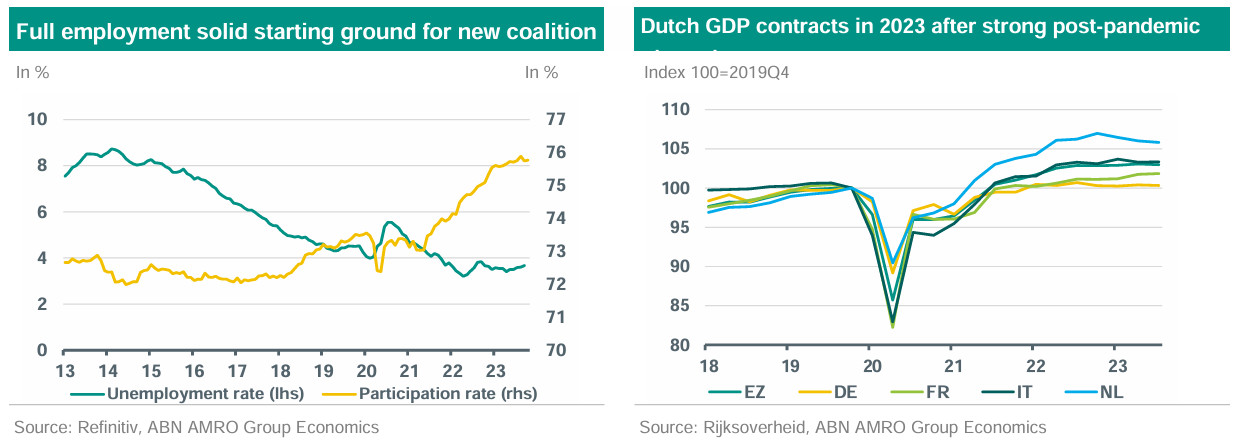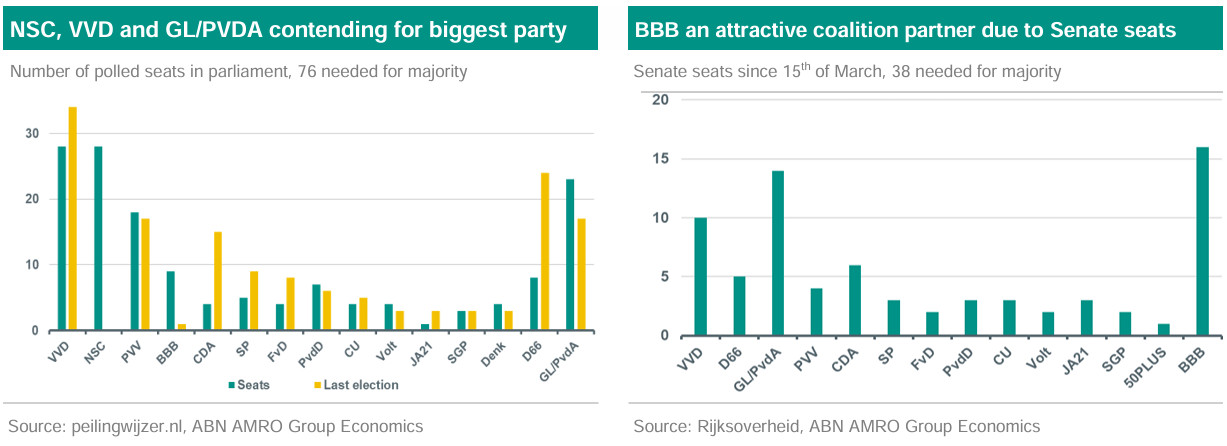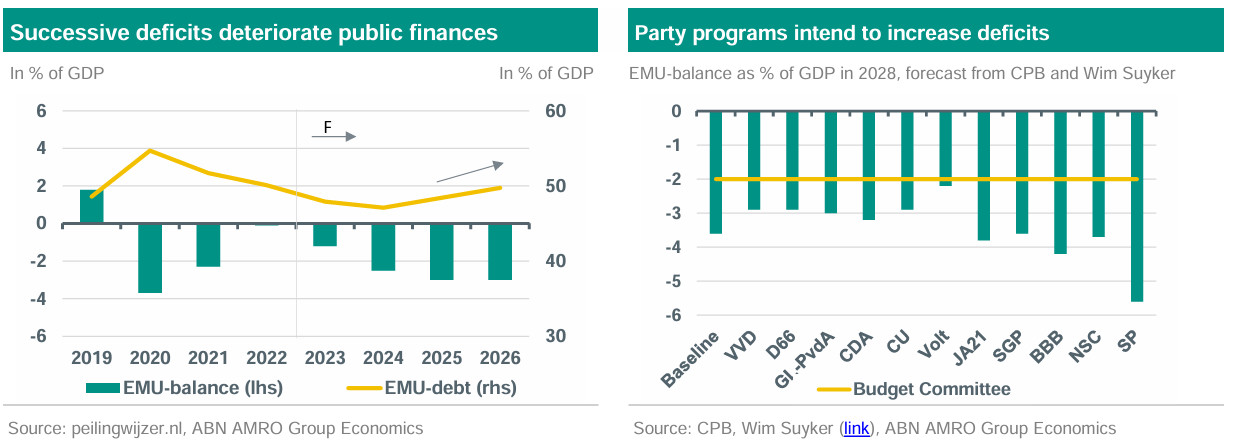Dutch rates Focus - The importance of the upcoming Dutch elections

The upcoming elections for Dutch parliament will shake up the political landscape as new political parties will play a significant role in the forming of a coalition. Polls indicate that there is a high likelihood of a centre right coalition, including the new political party of Pieter Omtzigt (called New Social Contract). Meanwhile, the Dutch economy has stagnated, although the labour market remains very tight. Furthermore, the low debt-to-gdp of around 50% gives the new coalition a good starting point but the programs of all political parties already point to an increase of the EMU-debt in the coming years.

Jaap Teerhuis
Senior Fixed Income Strategist
Prime Minister Rutte’s ‘Torentje’ vacated after 13 years
On Wednesday 22 November it is election day for the Netherlands, as a new parliament will be elected. On 7 July this year, the current caretaker centre-right government consisting of four parties, the VVD (conservative-liberal), D66 (social-liberal), CDA and CU (both democratic Cristian), fell on the topic of migration. The upcoming elections will prove to be a game changer for the Netherlands for a number of reasons. First, Mark Rutte (VVD) who has been Prime Minister for 13 years is not up for re-election vacating the ‘Torentje’, the office of the Prime Minister in The Hague. A second factor is that the political landscape has changed significantly since last elections for parliament, with recently founded parties such as the Farmer Citizen Movement (BBB) and New Social Contract (NSC) gaining significantly in the polls. This raises the question whether we get a centre-left or more right-orientated coalition. And finally the policy angle, as the next cabinet will have to make fundamental decisions in several critical policy areas such as climate, housing, energy transition, migration and nitrogen. Newly formed policy on all these areas, which has been delayed by the caretaker status of the government, will influence the economic trajectory of the country in the coming years.
In this note we look at the recent macro-economic backdrop before the elections, the latest election polls, possible coalitions and what the party programmes tell us about the funding need of the Dutch government.
Dutch economy stagnates but with full employment
After a strong post-pandemic recovery, 2023 has been a more challenging year for the Dutch economy. Inflation and the increasing effect of monetary tightening has had a negative effect on both domestic and external demand. This culminated in a technical recession in the first half of 2023 which continued in the third quarter. We expect growth to pick up slightly over the course of 2024. Despite a cooling of economic growth, the labour market remains tight and unemployment is expected to remain low due to still strong (public sector) labour demand and ageing of the workforce in the medium term.

New coalition has to solve a number of critical dossiers
The recent fall of the Dutch government had a limited but still a non-negligible impact on the economy. It led to delays on a number of contentious political items where decisive policy action was required. Examples are the lack of new housing construction, the extreme level of nitrogen in Dutch soil creating havoc on nature, policy uncertainty around climate policy and labour market reforms. The next coalition will be burdened with all of these challenges at the same time. Given these difficult and interacting dossiers, a complicated negotiating process is expected following the elections. The unfortunate result could be more delays on delivering on these dossiers as 2024 will be well under way before a new cabinet will be installed.
Election polls signal a shift to the (centre) right
Looking at the polls we see that the political landscape has changed significantly since the last elections for parliament and a continuation of the current coalition can be ruled out. Next to ideological differences, the caretaker coalition polls momentarily at 44 seats (76 needed for a majority, while it achieved 78 seats in last elections). Overall, there is a noticeable shift to the right, with currently the VVD, BBB, NSC and the PVV, ranging from centre-right to far right, polling at a total of 83 seats, enough for a majority. Still, a lot can happen until the elections.
At the moment, VVD is leading in the polls and if VVD will indeed get the most seats in parliament, the new prime minister will most probably come from this party. As a result, this would imply that the leader of the VVD, Dilan Yesilgöz, will become the first female Prime Minister in the history of The Netherlands.
New parties such as the Farmer Citizen Movement (BBB) and New Social Contract (NSC) tilted the playing field to the (centre) right. The recently formed NSC and their leader, former CDA MP Pieter Omtzigt, is the big newcomer polling at 28 seats at the moment. NSC is running on a centre-right platform focusing on government reform to improve public policy. As the NSC has performed steady in the polls since its inception, chances are high the party will become the big winner of this election.
Caroline van der Plas, leader of the Farmer Citizen Movement (BBB) was the big newcomer and winner of the Provincial elections in March 2023. The provincial elections have national implications because the outcome determines the makeup of the Dutch Senate as well. However, since the provincial elections the BBB has slipped in the polls. Still, the victory in the Provincial elections and the accompanying 16 seats in the Senate (38 needed for majority) provide the BBB a solid bargaining position for the upcoming coalition talks as an interesting coalition partner.
Although a swing to the left is less likely, another contender for the post of Prime Minister is Frans Timmermans. The former Vice President of the European Commission came back to participate in these domestic elections and now heads GL/PVDA, the combined party of two left parties GroenLinks and Partij van de Arbeid. GL/PVDA is the only more centre-left orientated party polling above 20 seats. They campaign on a programme which increases wealth and business taxation to alleviate the tax burden on lower incomes. Current polls and momentum indicate that GL/PVDA is slipping versus VVD and NSC, a new coalition including a left orientated party is therefore increasingly unlikely at this stage.

Party programmes signal higher deficits, while budget committee advocates prudence
Compared to many other eurozone countries, Dutch government finances are solid. Still, government finances are expected to deteriorate in the medium term, as successive deficits are expected to push up the debt-to-GDP ratio. The influential Dutch Budgetary Committee took aim at this worsening trajectory and advises the incoming coalition to balance spending and revenue given the longer term challenges of the Dutch economy. Ageing, the energy transition and climate-adaptation costs are all backloaded in terms of budgetary strain. In other words, to ensure debt sustainability the Committee advised to reduce the deficit in 2028 to 2% of GDP instead of the anticipated 3.6%.

Despite the advice to return to a 2% deficit in 2028, party programmes do not signal any intention to do so. Instead, forecasts based on the party programmes show that political parties are aiming for higher deficits. Given the current political landscape described above, the VVD, the NSC and the BBB are most likely to end up in a new coalition and based on their election programs, the deficit in 2028 would average -3.6%. Obviously, a lot can still happen during the coalition negotiations, but at this stage, the direction of all parties that will participate point towards a higher deficit, even the conservative parties such as VVD and CDA which would normally advocate lower government spending. There is no intention in the coming years to abide by the 2% deficit target laid down by the budget committee.
Elections will have limited impact on funding need in 2024
If the plans of the different potential coalition parties will be effectuated, this will result in a structural higher budget deficit for the coming years. However, for 2024 we do not expect that the plans of the new coalition will have a big impact on the deficit and the funding need for two reasons. First, the last coalition negotiations took a record nine months, even if this time the negotiations are quicker we expect 2024 to be well underway before a new coalition is installed. And when the new government is in office, it will take some time to implement the new policies. As such, the caretaker government will not implement new policies until the new government will be installed which will in our view have a downward effect on the funding need in 2024. We estimate that the budget deficit in 2024 will be 2.5% of GDP, which result in a cash deficit of EUR 26.6bn. The official deficit that was communicated in next year’s fiscal plan in October by the Ministry of Finance is 3.1%, but we believe that also next year the Dutch State will experience underspending due to the still tight labour market, supporting tax income.
Next year, the refinancing need for the two maturing DSLs is EUR 32.7bn and we estimate that the net money market amount at the end of this year to be EUR 20bn. This would bring the total funding need for the Dutch State at around EUR 79bn (see table below).

However, we see one uncertainty with regard to the funding need for next year. The Dutch State is in negotiations with the German government about the sale of the German part of the TenneT, the Dutch electricity grid company (TSO). The Dutch state is owner of this company and given the significant required investments in the electricity grid the coming years, it wants to divest the German part of the company. Although there is no agreement on the sale at this moment, it is widely expected that an agreement on the sale will be reached the coming few months. Furthermore, there is much speculation about the amount involved with the potential sale, where the amounts vary between EUR 20 and 30bn. If the sale will take place next year, most probably the proceeds in the sale will be directed to the DSTA, either direct or through the system of cash pooling (‘Schatkistbankieren’) of government enterprises, resulting in a significant lower funding need in 2024.
Lower redemption of Dutch government bonds in 2025, higher in years beyond
Looking beyond 2024, the budget deficit will, based on the plans of the political parties, increase but the forecasts of the deficits will be surrounded by uncertainty. What is relatively certain is the refinancing need of the maturing DSLs in the coming years. In the graph below, it is clear that in 2025 there is only one DSL maturing (the DSL July 2025) with a current outstanding amount of almost EUR 20bn. The DSTA will most probably not tap this bond in 2024 because of the short remaining maturity, so this means that in 2025 the refinancing need will be lower compared to 2024 and 2026 to 2028.

